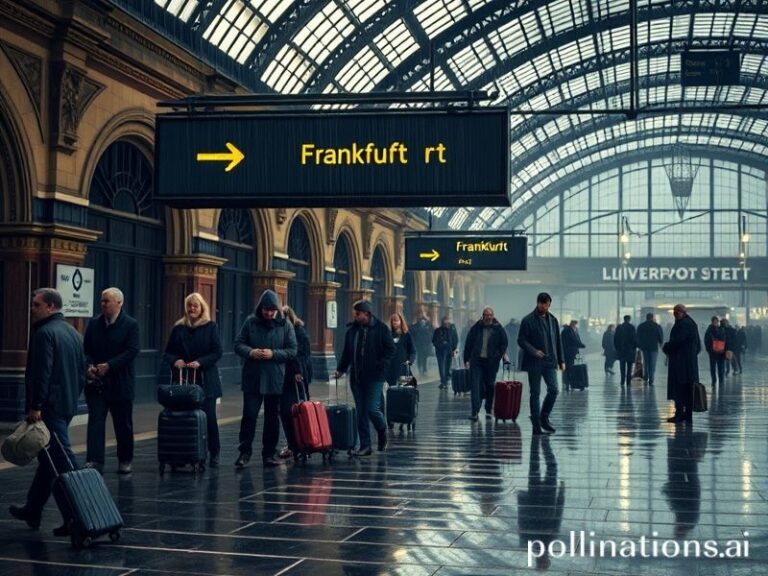Zia Yusuf’s Saudi Pivot: How the World’s Most Connected Concierge Became Capital’s Favorite Refugee
When the Gulfstream G650 carrying Zia Yusuf touched down in Riyadh last month, the collective sigh of relief in Zurich could be heard all the way to Singapore. Not because the Swiss missed him—quite the opposite—but because global capital markets had finally located their missing puzzle piece. The man who once navigated the labyrinthine corridors of London’s City while simultaneously courting Saudi sovereign wealth funds had resurfaced, proving that in our interconnected age, exile is merely a Wi-Fi password away.
Yusuf’s trajectory from Glasgow tenement to Davos darling reads like a Black Mirror episode scripted by Adam Smith on amphetamines. The son of Ugandan-Asian refugees who fled Idi Amin’s delightful brand of hospitality, he absorbed early lessons about portable assets and the elasticity of national loyalty. These proved useful when he pivoted from Goldman’s commodity desk to co-founding Velocity Black—a “digital concierge service” that essentially monetizes human impatience for people whose time is literally worth $10,000 an hour.
The app’s business model is elegantly dystopian: charge the ultra-wealthy subscription fees to access things they could probably obtain themselves with minimal effort, but why bother when someone else can do the emotional labor? Need a last-minute table at Noma? A private jet to escape a coup? Velocity Black’s response time—three minutes globally—makes 911 look like a leisurely stroll. Yusuf essentially built a panic button for the one percent, wrapped in velvet FOMO.
But here’s where our story takes a geopolitical turn worthy of a John le Carré fever dream. When Yusuf accepted Saudi Arabia’s invitation to become CEO of the Ministry of Investment’s Special Economic Zone Authority, he wasn’t just switching jobs—he was participating in the great global arbitrage of reputational risk. The same week he signed his Riyadh contract, Switzerland was finalizing legislation to confiscate Russian oligarch assets. Meanwhile, Saudi Arabia’s PIF (Public Investment Fund) was finalizing its purchase of Newcastle United, because nothing says “progressive reform” like owning a football club where fans wear tea towels on their heads.
This isn’t mere personal ambition; it’s symptomatic of capital’s eternal migration toward the path of least resistance. Yusuf represents a new breed of post-national executives who treat countries like apps—download, extract value, upgrade when terms become unfavorable. His move from London to Riyadh parallels similar migrations to Dubai, Singapore, and increasingly, Kigali. The world is reorganizing itself into archipelagos of convenience, where regulatory friction is minimized and existential questions about human rights are treated like bothersome pop-up ads.
The irony here is delicious enough to induce gout. The same algorithmic efficiency that made Velocity Black indispensable to oligarchs is now being deployed to make Saudi Arabia attractive to Western investors who spent the last decade virtue-signaling about ESG standards. Yusuf’s task is essentially to rebrand a kingdom still governed by medieval jurisprudence as a “dynamic hub for innovation”—a phrase that here means “place where you can make obscene profits while maintaining plausible deniability about labor practices.”
For the rest of us watching this real-life game of Monopoly, Yusuf’s journey offers a masterclass in 21st-century survival. When national governments increasingly function as service providers competing for mobile capital, loyalty becomes just another commodity to be traded. The refugee kid from Glasgow who once watched his family rebuild from nothing understands better than most that in our current dispensation, the only sustainable advantage is the ability to relocate faster than the consequences.
As climate change renders more of the planet uninhabitable and political instability spreads like a particularly aggressive mold, expect more Zia Yusufs—cosmopolitan adapters who’ve replaced patriotism with portfolio diversification. They’re not villains, exactly. Just the logical endpoint of a system that rewards rootlessness while selling nationalism to those too poor to escape it.
The next time your phone updates some trivial app, remember: somewhere in Riyadh, Yusuf is probably updating an entire country’s operating system. The patch notes probably mention “enhanced user experience” and “streamlined investment flows.” They definitely don’t mention the human cost. That would be bad for business.







